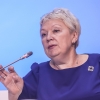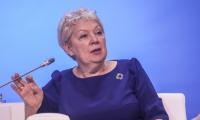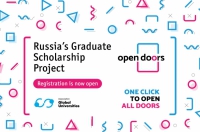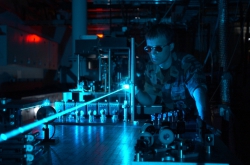Tuition-free education for engineers, medical specialists and teachers
According to Ms. Vasilyeva, this year, there will be 57 tuition-free positions in universities for every hundred school graduates. 47% of these positions will be in engineering programs, as this is what the country needs. There will also be an 8% increase in tuition-free positions in medical and a 10% increase in pedagogical programs. Statistics show that 80% of these program’s graduates are working within their field.
Target reception
The Ministry of Education and Science places emphasis on training students by means of target reception programs. "Target reception" is when a student, university and some organization sign an agreement where the university provides education, and the organization provides social services and support for the student. In return, the graduate has to work for the organization for no less than three years after graduation.
"Affiliated departments at enterprises and research establishments give the students an opportunity to not only gain practical skills, but to become engaged in their professional field from the very beginning of their careers, as well", comments the minister.
Career guidance for highschoolers
Career guidance is essential, believes Olga Vasilyeva. According to the Minister, the number of parents that first send their children to secondary professional education establishments has been increasing. The point is that after graduation, such young specialists can already start working in their field during their first year at university, thus getting advanced knowledge.
"This approach is really useful. We can see similar practices in all of the educational systems worldwide", underlines the minister.
She added that the state continues promoting blue-collar jobs; for instance, it inspires young specialists to take part in the WorldSkills international contests. The minister also expressed gratitude to universities who teach high-schoolers particular professional skills by means of specialized programs.
The point of bachelor's programs is to help choose one's future
As of now, there are different types of higher education programs in Russia — bachelor's, master's, and "specialists". Recently, the amount of bachelor's graduates has greatly increased — from 7% in 2002 to 41% in 2016.
"The main point of a bachelor's program is to give a person the opportunity to understand his interests and skills, so as to choose a more narrow focus for one’s master's program. Bachelor's graduates can adapt a lot easier, as they continue to study. What is more, they always have the opportunity to apply for a master's program in different field", comments Ms. Vasilyeva.
Extra entrance examinations work well with technical universities
Any university whose applicants have been having really high grades for the Unified State Exam can introduce an additional written examination. Thus, in-demand universities can set higher requirements for becoming their first-years.
Still, the question — whether such exam is necessary or not — remains open, and is widely discussed by the Council of Russian Rectors. In most cases, the examination is relevant for universities with programs in engineering and natural sciences, as they often require more specific evaluation of the applicant's knowledge.
We'd like to note that the mean Unified State Exam score amongst ITMO's first years who enrolled on Math programs in 2016 was the highest in the country — 99.4 points. ITMO also got in the top in other program tracks: it came first in the mean score for applicants to "Electronic engineering, radio engineering and communications" - 84.5, and second for "Informatics and computer engineering" (91.3) and "Automation and Management" (83.1). For "Tool engineering and technical optics" programs ITMO was ranked second as well (mean score — 80.3); still, one has to take into account that the university accepted 176 students to this program whereas National Research Nuclear University MEPhI who was placed 1st accepted only 10. The applicants for programs in "Informational Security" showed high mean scores as well — 88,9, which is third best index in Russia. For programs in "Business Informatics" (87.6), "Chemical and Bio- Technologies" (81.6) and "Nuclear Physics and Technologies" (80.2) ITMO University was ranked 4th.
Promotion of online education
These days, there are about 130 online courses for Russian students developed by the country's leading universities. The Ministry of Education supports the tendency to development of online courses, as they contributes to promotion of extramural education.
"In an ideal situation, every student should have the opportunity to listen to a course from the country's best university in a particular field. For example, you study at a technical university, but you want to get a course in theoretical physics at a different establishment. So, you listen to it online, pass an online examination, and get a certificate. Such system will contribute to the students' development and broaden their outlook", comments Ms. Vasilyeva.
More investments in science
This year, the state voted 317 billion rubles on science. Also, multiple programs on involving private investments are being developed.
"The president has approved the strategy on development of science which implies a certain priorities — those would be not developing science for the purpose of science, but using it for improving the quality of life, food products, development of personalized medicine, construction methods, residential design and so on", explains the minister.
There were 30 pilot projects on opening engineering centers at universities launched in collaboration with the Ministry for Industry and Trade. During the last three years, two billion rubles were invested in these projects, and the returns have already exceeded these investments. The amount of science articles by Russian scientists published in high-ranking international journals has increased, and the development of collaborative MegaScience projects with international research centers continues.
Supporting young scientists
As of now, there are more than 4.5 thousand scientists under the age of 35 working in Russia's research establishments. This index is to be increased by 1.5 times in 2017−2018. The government is working on a system for encouraging young scientists to stay and work at research establishments and defend doctoral theses. What is more, the work on a new law concerning science is in progress; it will include new methods to creating new Thesis Committees at different universities all over Russia.
"We'll be using this approach so as to increase the number of universities that can assess theses along with the Higher Attestation Commission. Each of these establishments will follow strict antiplagiarism measures. Another issue is that of scientific advisors — those have to work with three research students maximum, not seven or eight, like they do it now. The work of a scientific advisor is essential for any thesis", explained Olga Vasilyeva.
There will be more key universities
The minister underlined that Russia's major universities are to become the social, economic and cultural centers of their regions. According to her, the program on creating more key universities is no less important than the one on increasing Russia’s competitive ability on the international education market. As of now, there are 11 of them; soon, there will be a new contest on getting this status. By the end of this year, 30 universities from 30 regions of Russia are to become part of the program, and by 2019, there are to be 50 of them. As of now, 1,25 million rubles from the federal budget have already been reserved for supporting these universities during the following year.






